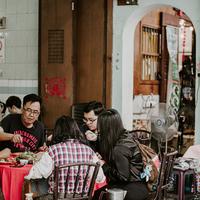Part 7
Teil 7
Part 7
Parte 7
Partie 7
Parte 7
第7部
파트 7
Parte 7
你 想 好 了 吗 ?
Hast du nachgedacht?
Have you considered?
Думали ли вы об этом?
是 的 , 我 想 先 来 些 豆腐 汤 。
Yes, I want to have some tofu soup first.
Да, я бы хотел начать с супа из тофу.
然后 我 想 吃 烧鸡 。
Then I want to eat chicken.
好 的 。
Ok.
那 你 呢 ?
und du?
how about you?
我 想 先 来 一份 色拉 , 然后 我 想要 你们 的 特色 意大利 面 。
Ich möchte zuerst einen Salat und dann möchte ich Ihre Spezialität Pasta.
I want to have a salad first, then I want your special pasta.
你 想来 点 酒 吗 ?
Möchtest du etwas Wein?
Do you want some wine?
是 的 。
Yes.
请 给 我们 来 半瓶 自 酿 红葡萄酒 。
Bitte bringen Sie uns eine halbe Flasche Rotwein des Hauses mit.
Please give us half a bottle of homemade red wine.
Veuillez nous apporter une demi-bouteille de vin rouge maison.
半瓶 自酿 红葡萄酒 马上 就 到 , 我 还 会 给 你们 拿 些 面包 。
Eine halbe Flasche Rotwein des Hauses kommt, und ich hole dir Brot.
Half a bottle of homemade red wine will arrive soon, I will give you some bread.
还要 其他 什么 吗 ?
Noch etwas?
What else?
不 , 就 这么 多 了 。
Nein, das ist alles.
No, that's all.
谢谢 。
Thank you.
那么 , 告诉 我 , 林 翰 , 你 父母 最近 都 在 忙 些 什么 ?
Also, sag mir, Lin Han, was machen deine Eltern in letzter Zeit?
So, tell me, Lin Han, what are your parents busy with recently?
我 爸爸 还 在 工作 。
My father is still working.
我 妈妈 就 在 家里 的 花园 忙碌 , 她 很 喜欢 这样 。
Meine Mutter ist zu Hause im Garten beschäftigt, und sie liebt es.
My mother is busy in the garden at home, she likes it very much.
私の母は家の庭で働いていて、それが大好きです。
他们 好像 都 很 忙 啊 , 他们 的 身体 还好 吧 ?
Sie scheinen beschäftigt zu sein, wie geht es ihnen?
They seem to be very busy, are they okay?
是 的 , 很 好 , 你 的 父母 怎么样 ?
Yes, very good, how is your parents?
我 的 父母 经常 去 南方 拜访 亲戚 。
My parents often go to the South to visit relatives.
什么 亲戚 住 在 那儿 ?
What relatives live there?
Какие родственники там живут?
我 妈 的 哥哥 和 妹妹 住 在 那儿 。
My mother and sister live there.
我 住 的 地方 离 我 叔叔 和 阿姨 很 近 。
Ich wohne in der Nähe meines Onkels und meiner Tante.
The place where I live is very close to my uncle and aunt.
他们 都 比 你 的 父母 大 吗 ?
Sind sie alle älter als deine Eltern?
Are they older than your parents?
还是 小 ?
Or younger?
他们 的 年纪 要 大 不少 , 但是 他们 仍然 很 活跃 。
Sie sind viel älter, aber immer noch sehr aktiv.
They are much older, but they are still very active.
他们 是 如何 保持 这种 活力 的 呢 ?
Wie halten sie es am Leben?
How do they maintain this vitality?
他们 一直 都 过 着 很 积极 的 生活 。
Sie haben immer ein sehr aktives Leben geführt.
They have always lived a very active life.
我 叔叔 以前 在 一家 大 公司 做 销售 。
Mein Onkel arbeitete früher im Vertrieb für ein großes Unternehmen.
My uncle used to sell in a big company.
我 阿姨 以前 是 一位 学校 老师 。
Meine Tante war früher Schullehrerin.
My aunt used to be a school teacher.
他们 现在 都 退休 了 。
Sie sind jetzt alle im Ruhestand.
They are all retired now.
他们 住 在 城里 还是 乡村 ?
Wohnen sie in der Stadt oder auf dem Land?
Do they live in the city or in the country?
他们 住 在 村里 一栋 很 漂亮 的 房子 里 , 离 城里 不 远 。
Sie lebten in einem sehr schönen Haus im Dorf, nicht weit von der Stadt.
They lived in a beautiful house in the village, not far from the city.
那 一定 很 不错 。
Das muss schön sein.
That must be very good.
是 的 , 每年 大部分 的 时间 里 , 他们 可以 去 森林 里 散步 。
Ja, sie können fast das ganze Jahr über im Wald spazieren gehen.
Yes, most of the time, they can go for a walk in the forest.
在 冬天 , 他们 可以 滑雪 。
In the winter, they can ski.
他们 怀念 那座 城市 吗 ?
Do they miss the city?
不 , 从 市区 到 那儿 只有 30 分钟 的 车程 。
No, it is only 30 minutes from downtown to there.
他们 也 可以 坐 火车 。
They can also take the train.
我们 的 菜 来 了 。
Our dishes are coming.

